FIFA's top bosses, including Sepp Blatter, suspended
By John Sinnott, CNN
Updated 2228 GMT (0528 HKT) October 8, 2015

35 photos: FIFA corruption scandal timeline
June 1, 2011 – Despite a last minute attempt by the English FA to postpone the vote -- a proposal which garnered just 17 out of the available 208 votes -- Sepp Blatter is re-elected for a fourth term as president of FIFA at the 61st FIFA Congress at Hallenstadion in Zurich. He vows to learn from past mistakes and undertake a reform agenda.
Hide Caption
18 of 35
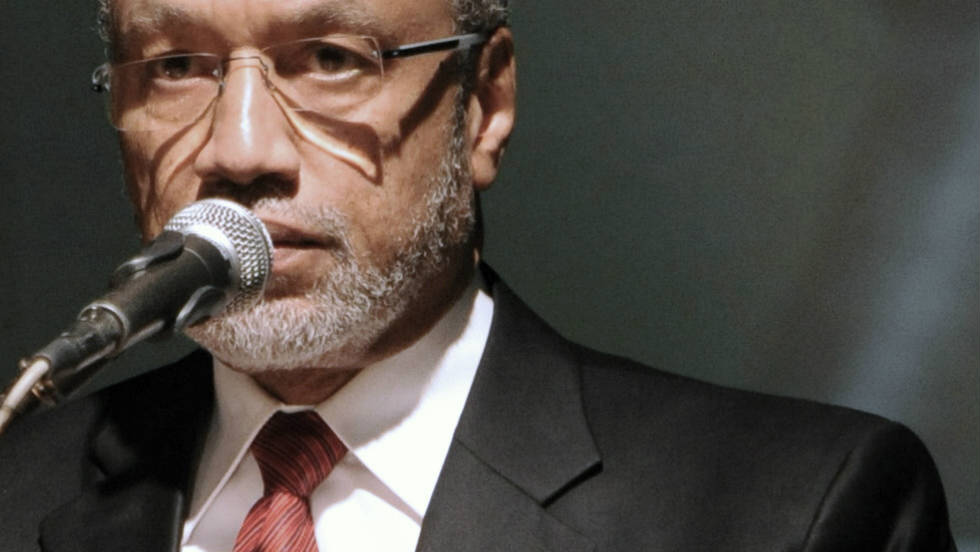
35 photos: FIFA corruption scandal timeline
July 23, 2011 – Mohamed Bin Hammam is banned for life by FIFA after a two-day hearing into bribery allegations. The ban is annulled a year later due to lack of evidence.
Hide Caption
19 of 35

35 photos: FIFA corruption scandal timeline
October 21, 2011 – Sepp Blatter announces the introduction of four new task forces and a "Committee of Good Governance" aimed at reforming the organization and repairing its reputation.
Hide Caption
20 of 35
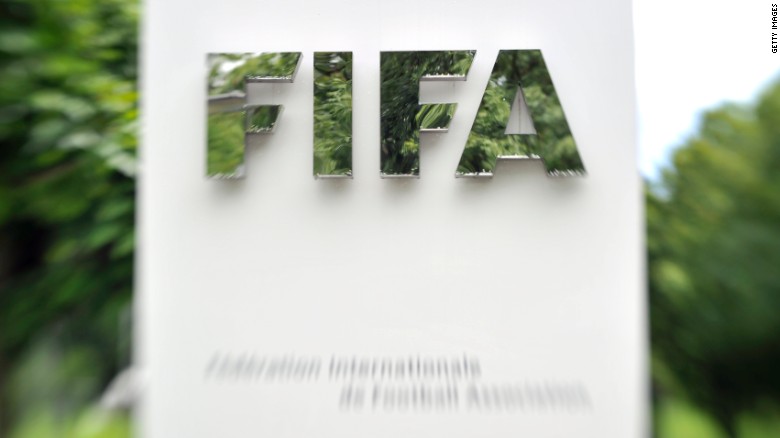
35 photos: FIFA corruption scandal timeline
March 30, 2012 – FIFA announces its executive committee has approved proposed changes to its Ethics Committee, splitting it into two entities -- one to investigate allegations and another to rule on them. It follows a report by the Independent Governance Committee (IGC) commissioned after Mohamed Bin Hammam's ban, that found FIFA's past handling of corruption scandals had been "unsatisfactory."
Hide Caption
21 of 35

35 photos: FIFA corruption scandal timeline
April 24, 2012 – The Council of Europe, a watchdog that oversees the European Court of Human Rights,criticizes Sepp Blatter in a damning report into FIFA's handling of bribery allegations. The report says it would be "difficult to imagine" that the FIFA president would have been unaware of "significant sums" paid to unnamed FIFA officials by sports marketing company International Sports and Leisure (ISL) in connection with lucrative contracts for World Cup television rights. However it makes no allegations that he had any involvement in corruption.
Hide Caption
22 of 35

35 photos: FIFA corruption scandal timeline
July 17, 2012 – Sepp Blatter announces that former U.S. attorney Michael J Garcia and German judge Hans-Joachim Eckert (pictured) have joined FIFA to probe allegations of wrongdoing. Their first task will be to investigate a Swiss court document after an investigation into alleged illegal payments made by FIFA marketing partner ISL to former FIFA president Joao Havelange and former executive committee member Ricardo Teixeira. However, they will also investigate old cases -- including the process surrounding the decision to award the 2018 and 2022 World Cups to Russia and Qatar. Meantime, Mohamed Bin Hamman is again suspended over new corruption allegations by the Asian Football Confederation (AFC), which he used to lead. Bin Hammam says he is innocent but in December 2012 he resigns all his football positions after a FIFA report finds him guilty of violating the conflict of interest clauses in its Code of Ethics and bans him from all football-related activity for life.
Hide Caption
23 of 35

35 photos: FIFA corruption scandal timeline
December 17, 2012 – President of the South African Football Association (SAFA) Kirsten Nematandani (pictured) and four other SAFA officials are suspended as an act of "good governance" following a report by FIFA, which adjudged four friendly matches ahead of Africa's first World Cup in 2010 had been fixed. SAFA later decides FIFA went beyond its mandate in suspending them before its investigation had concluded and reinstates the officials to their posts. In May 2015, Nematandani tells South African broadcaster ANN7 he has yet to hear from FIFA in relation to the investigation. "This is about my reputation," he says. "My name has to be cleared."
Hide Caption
24 of 35

35 photos: FIFA corruption scandal timeline
January 9, 2013 – FIFA imposes a worldwide lifetime ban from football on 41 players from Korea who became embroiled in match-fixing activities in their domestic league, extending a ban handed down by the Korea Football Association (KFA) in 2011. The charges relate to alleged match-fixing in Korea's domestic K-League competition. All but one case were centered on offering or accepting bribes to throw matches.
Hide Caption
25 of 35

35 photos: FIFA corruption scandal timeline
February 4, 2014 – A report by police agency Europol reveals that 380 matches across Europe have been fixedby an Asia-based crime syndicate, including World Cup and European Championship qualifiers as well as the continent's top club competitions. Scores of people have been arrested across 15 countries, it says. FIFA vows to act on the revelations, but says it will need help from outside agencies to eradicate match-fixing.
Hide Caption
26 of 35
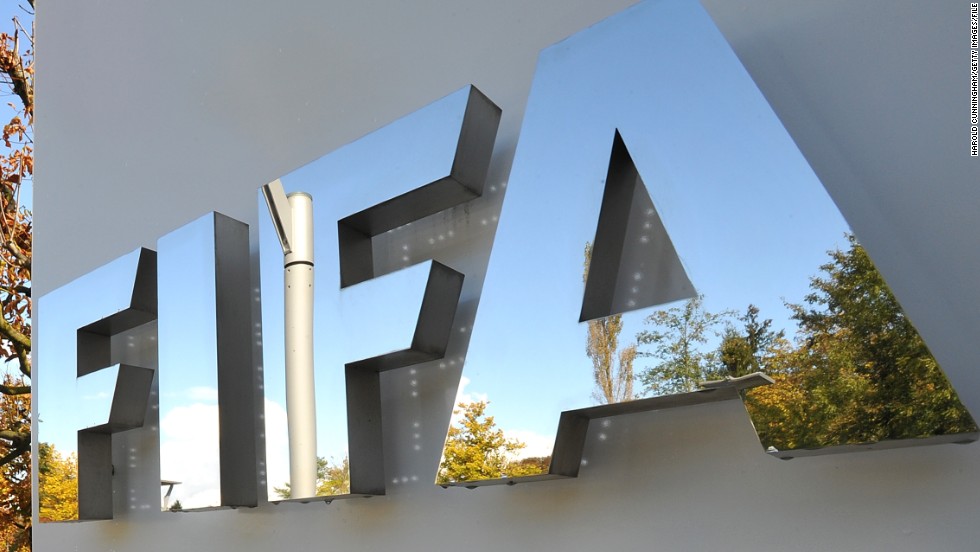
35 photos: FIFA corruption scandal timeline
March 11, 2013 – FIFA says executive committee member Vernon Manilal Fernando of Sri Lanka has been suspended at the request of Michael Garcia and Hans-Joachim Eckert, co-chairs of the investigatory and adjudicatory bodies of the Ethics Committee respectively. No details of his alleged transgression were released, but FIFA said the decision was based on alleged violations of its Code of Ethics, including conflicts of interest, offering and accepting bribes, bribery and corruption, "in order to prevent the interference with the establishment of the truth with respect to proceedings now in the adjudicatory chamber." He is later given a lifetime ban, which he unsuccessfully appeals to the Court of Arbitration for Sport.
Hide Caption
27 of 35

35 photos: FIFA corruption scandal timeline
April 30, 2013 – An internal investigation by FIFA's Ethics Committee clears Sepp Blatter of misconduct in the bribery scandal, but his predecessor, Brazilian Joao Havelange, resigns as honorary president for his part in the scandal. Havelange and former executive committee members Ricardo Teixeira and Nicolas Leoz were all found to have accepted illegal payments from former marketing partner International Sports and Leisure (ISL) between 1992 and 2000.
Hide Caption
28 of 35
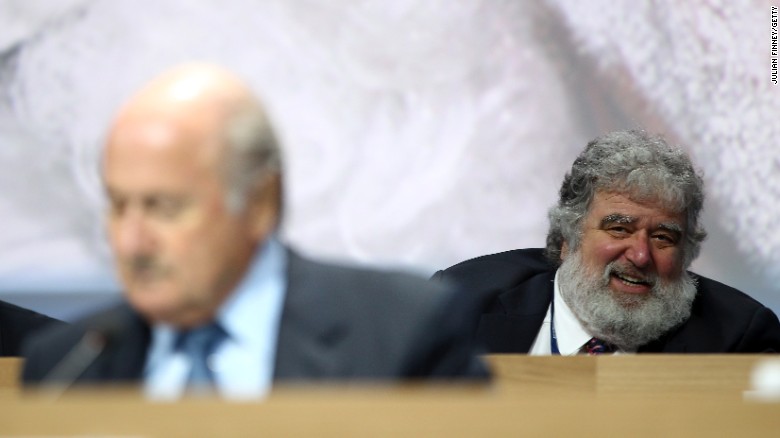
35 photos: FIFA corruption scandal timeline
May 6, 2013 – FIFA's Ethics Committee suspends outgoing executive committee member Chuck Blazer (pictured back right) for 90 days "based on the fact that various breaches of the Code of Ethics appear to have been committed" by the American. Blazer is former general secretary of CONCACAF, the body which governs football in North and Central America and the Caribbean, and his suspension follows a report by its integrity committee. Blazer denies any wrongdoing.
Hide Caption
29 of 35

35 photos: FIFA corruption scandal timeline
June 13, 2014 – German footballer Franz Beckenbauer, the only man to win the World Cup as captain and coach, is provisionally suspended from any football-related activity for 90 days for failing to cooperate with a FIFA corruption investigation. FIFA says Beckenbauer had been asked to help with its Ethics Committee's probe into allegations against Qatar 2022 and the World Cup bidding process. Beckenbauer tells German media that he did not respond to questions by the chairman of the Ethics Committee's investigatory body because they were in English and he did not understand them.
Hide Caption
30 of 35

35 photos: FIFA corruption scandal timeline
Hans-Joachim Eckert (pictured), chairman of the adjudicatory chamber of FIFA's Ethics Committee, releases a summary of the committee's investigation into the bidding process for the 2018 and 2022 World Cup. The summary, by Eckert, says Qatar and Russia were not guilty of any alleged corruption, clearing them of wrongdoing. Michael Garcia, the author of the full report, and chairman of the Ethics Committee's investigatory body, wanted the report to be published in full. Garcia says the summary contains "incomplete and erroneous representations of the facts and conclusions detailed in the investigatory chamber's report."
Hide Caption
31 of 35
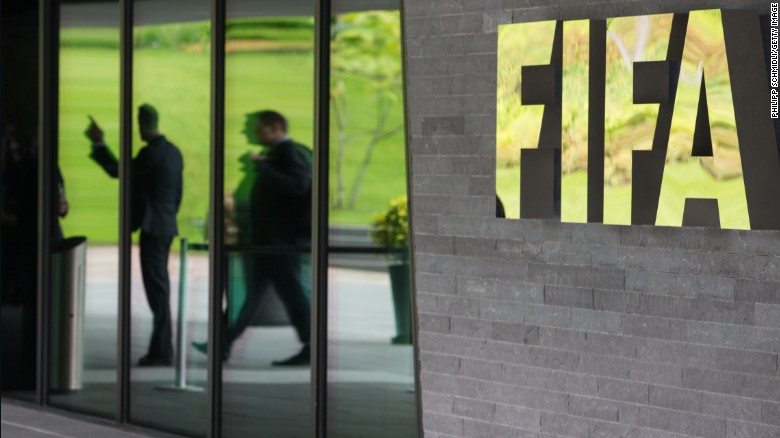
35 photos: FIFA corruption scandal timeline
November 18, 2014 – FIFA lodges a criminal complaint with the Swiss judiciary relating to the "international transfers of assets with connections to Switzerland, which merit examination by the criminal prosecution authorities."
Hide Caption
32 of 35

35 photos: FIFA corruption scandal timeline
December 17, 2014 – Michael Garcia resigns as chairman of the investigatory body of the Ethics Committee, following FIFA's decision to throw out his appeal after he complained about the way his report into the World Cup bidding process had been summarized by Hans-Joachim Eckert.
Hide Caption
33 of 35

35 photos: FIFA corruption scandal timeline
December 19, 2014 – FIFA decides to publish a redacted version of Michael Garcia's investigative report into alleged corruption surrounding the bidding process for the tournaments. The decision was unanimously endorsed by FIFA's 25-person executive committee.
Hide Caption
34 of 35

35 photos: FIFA corruption scandal timeline
May 27, 2015 – At the request of U.S. officials, Swiss authorities raid FIFA's headquarters in Zurich and arrest seven people. Meantime, the U.S. Department of Justice announces the unsealing of a 47-count indictment detailing charges against 14 people for racketeering, wire fraud and money laundering conspiracy. They include FIFA officials accused of taking bribes totaling more than $150 million and in return provided "lucrative media and marketing rights" to soccer tournaments as kickbacks over the past 24 years. Separately Switzerland announces its own investigation into the awarding of the World Cup bids to Russia in 2018 and Qatar in 2022.
Hide Caption
35 of 35
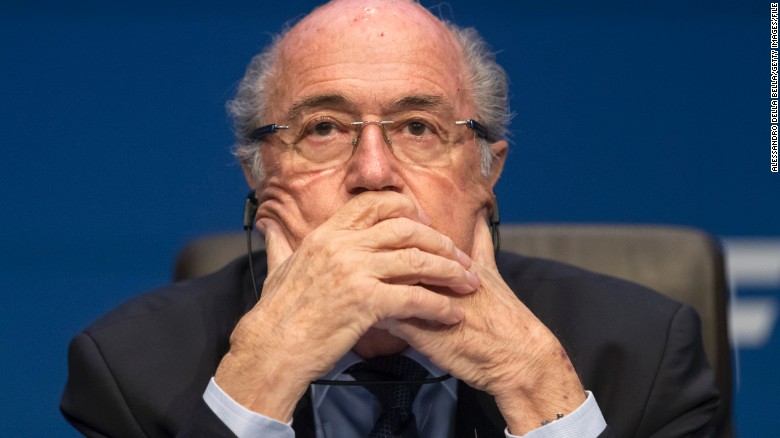
35 photos: FIFA corruption scandal timeline
October 8, 2015 – Has FIFA president Sepp Blatter spent his last day as head of football's world governing body? The 79-year-old Swiss was provisionally banned for 90 days Thursday by the adjudicatory chamber of FIFA's Ethics Committee, though the duration of the ban could be extended by 45 days.
Hide Caption
1 of 35

35 photos: FIFA corruption scandal timeline
October 8, 2015 – UEFA president and FIFA vice-president Michel Platini was also provisionally banned for 90 days. Platini is one of the FIFA presidential candidates hoping to succeed Blatter.
Hide Caption
2 of 35

35 photos: FIFA corruption scandal timeline
October 8, 2015 – South Korean billionaire and FIFA presidential candidate Chung Mong-joon was banned for six years and fined $103,000 based on findings relating to the bidding process for the 2018 World Cup in Russia and the 2022 tournament in Qatar.
Chung, a former FIFA vice president, vociferously denies any wrongdoing and attacked his colleagues for leaks that he says are designed to hurt his candidacy.
Chung, a former FIFA vice president, vociferously denies any wrongdoing and attacked his colleagues for leaks that he says are designed to hurt his candidacy.
Hide Caption
3 of 35
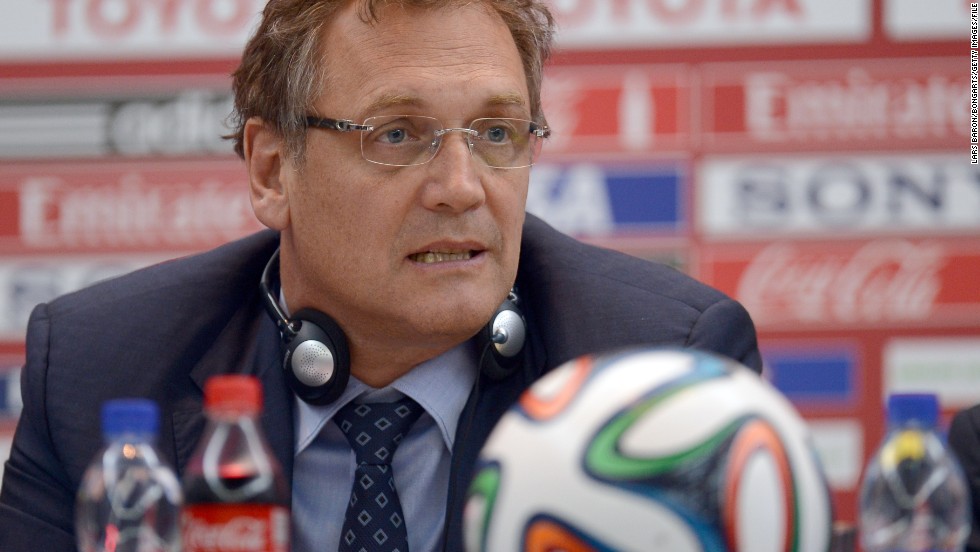
35 photos: FIFA corruption scandal timeline
October 8, 2015 – FIFA secretary general Jerome Valcke was suspended for 90 days.
Hide Caption
4 of 35
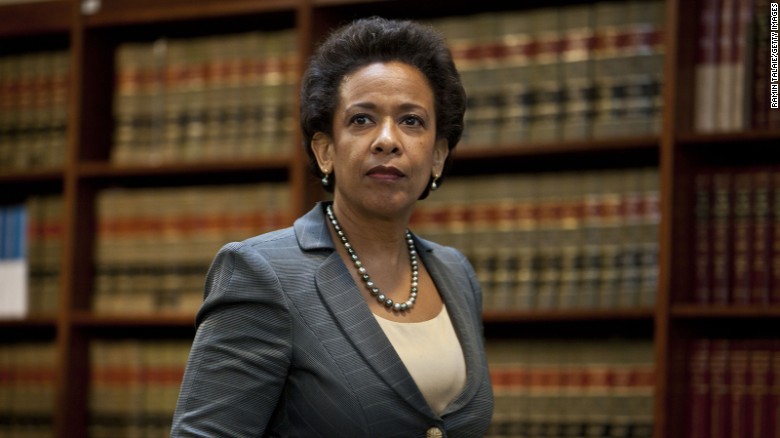
35 photos: FIFA corruption scandal timeline
September 14, 2015 – U.S. Attorney General Loretta Lynch announces that 'additional charges against individuals and entities' are likely following the assessment of new evidence.
Hide Caption
5 of 35

35 photos: FIFA corruption scandal timeline
September 9, 2015 – FIFA Vice-President Prince Ali Bin al-Hussein of Jordan adds his name to the list of candidates seeking to replace Sepp Blatter. The election at scandal-hit FIFA is on February 26, 2016.
Hide Caption
6 of 35

35 photos: FIFA corruption scandal timeline
July 30, 2015 – South Korean billionaire and former FIFA vice president, Chung Mong-Joon announces his intention to run for the top job in world soccer.
Hide Caption
7 of 35

35 photos: FIFA corruption scandal timeline
July 29, 2015 – European football chief Michel Platini, seen here with Blatter (left), is the leading candidate to replace the outgoing president. The former France captain is also a vice-president in FIFA's Executive Committee.
Hide Caption
8 of 35
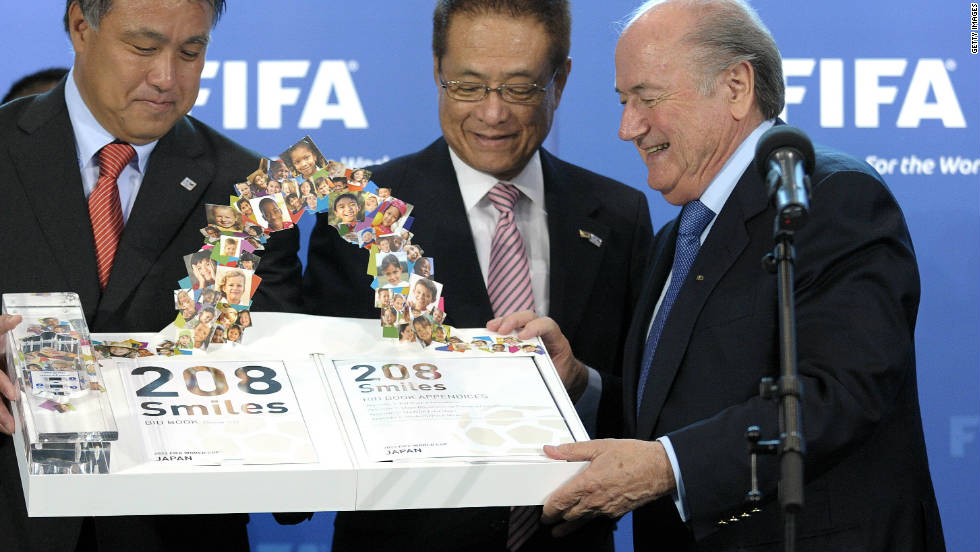
35 photos: FIFA corruption scandal timeline
May 14, 2010 – A turbulent period for FIFA began in May 2010 when the world's governing body for soccer was presented with official bid documents by Australia, England, Netherlands/Belgium, Japan, South Korea, Qatar, Russia, Spain/Portugal and the United States for the 2018 and 2022 World Cups. During the ceremony at its Swiss headquarters, FIFA announced dates for inspections of the bidding nations from July-September.
Hide Caption
9 of 35
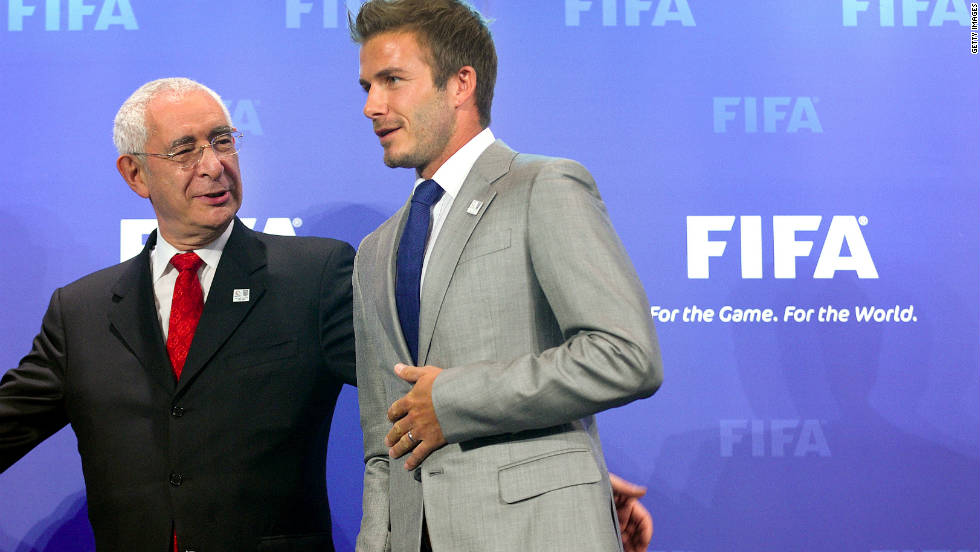
35 photos: FIFA corruption scandal timeline
May 16, 2010 – British newspaper Mail On Sunday reveals that English bid leader David Triesman (pictured here with soccer star David Beckham) was secretly recorded making comments about alleged attempts by Spain and Russia to bribe referees at the imminent 2010 FIFA World Cup.
Hide Caption
10 of 35
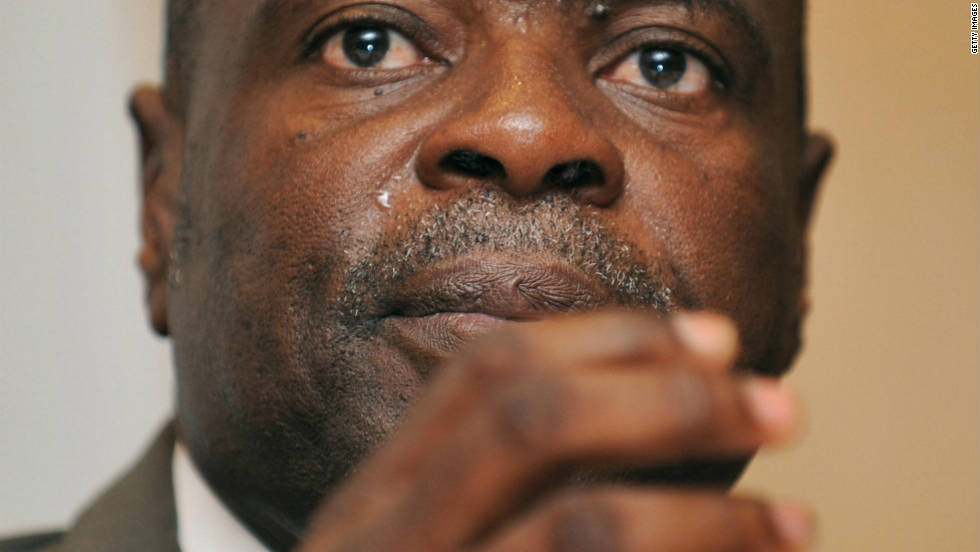
35 photos: FIFA corruption scandal timeline
November 18, 2010 – FIFA's Ethics Committee confirms the suspension of six FIFA officials including executive committee members Amos Adamu (pictured) and Reynald Temarii, after claims by Britain's Sunday Times newspaper that they offered to sell their World Cup votes. Adamu receives a three-year ban and $11,947 fine and Temarii a 12-month ban and a $5,973 fine. The committee also rules that there is no evidence to support allegations of collusion between rival bid teams. Both Adamu and Temarii appeal unsuccessfully to FIFA's Appeal Committee and Adamu later also files an unsuccessful appeal to the Court of Arbitration for Sport (CAS). In May 2015, FIFA bans Temarii for another eight years for allegedly accepting money from former Asian Football Confederation president Mohamed Bin Hammam to cover legal costs of his appeal of FIFA's 2010 ban.
Hide Caption
11 of 35

35 photos: FIFA corruption scandal timeline
November 29, 2010 – Issa Hayatou from Cameroon (pictured) is one of three FIFA officials -- the others Nicolas Leoz from Paraguay and Ricardo Teixeira from Brazil -- who are named in a BBC program which alleges they took bribes from the International Sports and Leisure (ISL) marketing company who secured World Cup rights in the 1990s. A day later, Hayatou says he is considering legal action against the BBC. All three would have voted on the hosts for the 2018 and 2022 World Cups. The International Olympic Committee's Ethics Commission later looks into the claims against Hayatou -- as he was an IOC member. It finds he had personally received a sum of money from ISL as a donation to finance the African Football Confederation (CAF)'s 40th anniversary and recommends he be reprimanded. In 2013, an internal investigation finds Leoz and Teixeira accepted illegal payments from ISL but says the acceptance of bribe money was not punishable under Swiss law at the time. Its report says that as both have resigned their positions with FIFA further steps over "the morally and ethically reproachable conduct of both persons" are superfluous.
Hide Caption
12 of 35
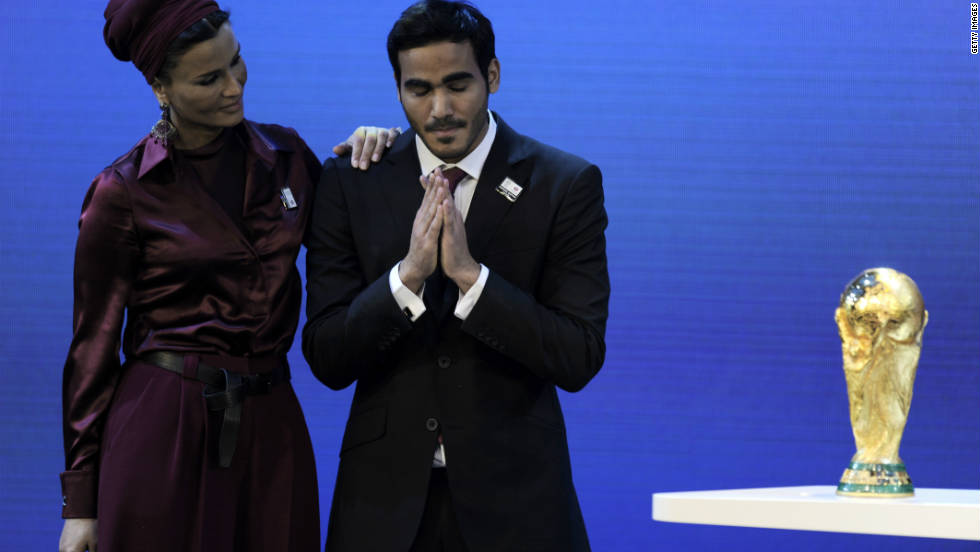
35 photos: FIFA corruption scandal timeline
December 2, 2010 – The winning bids for the 2018 and 2022 World Cup finals are announced. Russia wins the bid to host the 2018 tournament. But the big shock came when Blatter announced that Qatar would host the 2022 finals, despite FIFA's bid inspection report stating that hosting the World Cup in June and July would be"considered as a potential health risk for players, officials, the FIFA family and spectators, and requires precautions to be taken."
Hide Caption
13 of 35
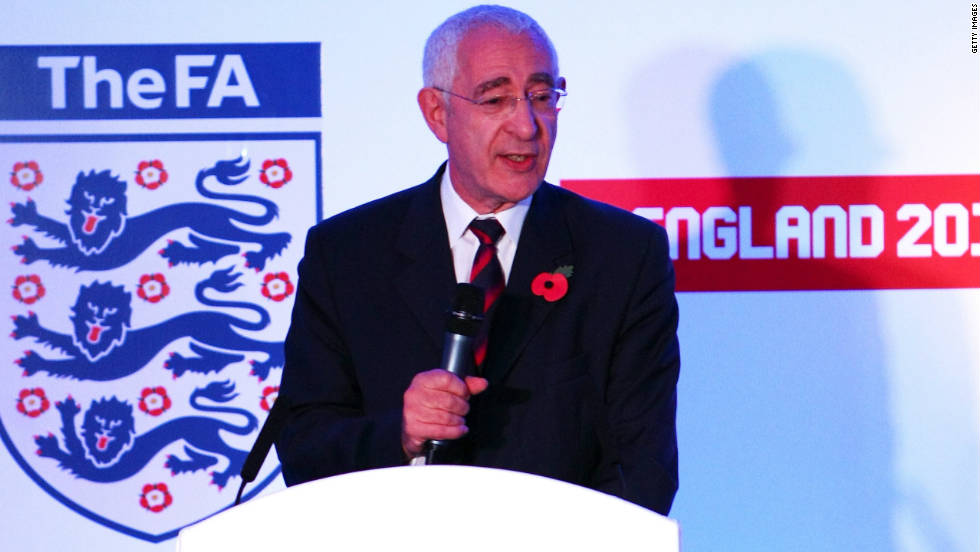
35 photos: FIFA corruption scandal timeline
May 10, 2011 – Just a few weeks before FIFA's presidential vote, former English Football Association chairmanDavid Triesman testifies at a UK parliamentary enquiry into England's failed 2018 bid. Under the cover of parliamentary privilege, Triesman accuses FIFA Executive Committee members Jack Warner, Nicolas Leoz, Ricardo Teixeira and Worawi Makudi of trying to secure cash and privileges in return for their vote. In other evidence submitted to the committee from the Sunday Times, it was alleged that FIFA vice-president Issa Hayatou along with fellow Executive Committee member Jacques Anouma has been paid $1.5 million to vote for Qatar as the 2022 World Cup host. All those accused, and the Qatar Football Association, strenuously deny the allegations.
Hide Caption
14 of 35

35 photos: FIFA corruption scandal timeline
May 26, 2011 – FIFA announces it will investigate Jack Warner (pictured), who ran the CONCACAF federation covering Central and North America, and Mohamed Bin Hammam, head of the Asian Football Confederation, over bribery allegations. It follows a report by fellow Executive Committee member Chuck Blazer alleging that they paid $40,000 worth of bribes to secure the support of members of the Caribbean Football Union. They deny the claims, with Warner promising a "tsunami" of revelations to clear his name. Bin Hammam claims the accusations are part of a plan to force him to withdraw as a candidate for FIFA's presidency. He is incumbent Sepp Blatter's only opponent in FIFA's presidential election due to be held June 1.
Hide Caption
15 of 35
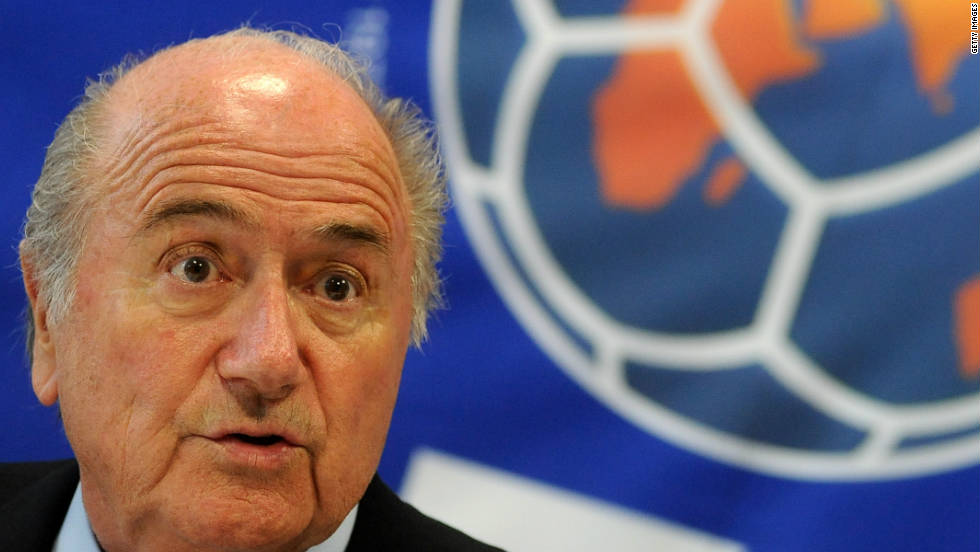
35 photos: FIFA corruption scandal timeline
May 27, 2011 – FIFA says it will expand its corruption probe to include Sepp Blatter, after Mohamed Bin Hammam claimed Blatter knew about cash payments he was accused of giving to national football association in exchange for pro-Hammam votes during Qatar's 2022 World Cup bid. Blatter maintains that the allegations are "without substance," and two days later is exonerated by FIFA's Ethics Committee.
Hide Caption
16 of 35
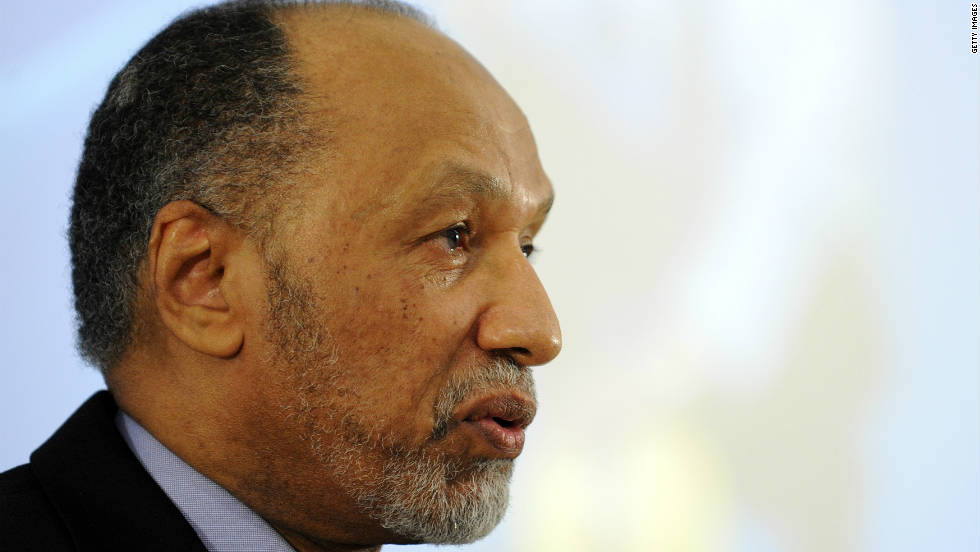
35 photos: FIFA corruption scandal timeline
May 29, 2011 – But FIFA's Ethics Committee upholds the complaints against Mohamed Bin Hammam (pictured) and Jack Warner. Bin Hammam is effectively barred from standing in the FIFA leadership election. Warner's tsunami turns out to be an email, where secretary general Jerome Valcke seems to suggest that Qatar "bought" the right to host the 2022 World Cup. After initially threatening legal action, Qatar withdraws its complaint when Valcke explains he was referring to Qatar's large, and legal, campaign budget, rather than bribes. Warner faces no further action following his resignation and the presumption of innocence remains.
Hide Caption
17 of 35

35 photos: FIFA corruption scandal timeline
June 1, 2011 – Despite a last minute attempt by the English FA to postpone the vote -- a proposal which garnered just 17 out of the available 208 votes -- Sepp Blatter is re-elected for a fourth term as president of FIFA at the 61st FIFA Congress at Hallenstadion in Zurich. He vows to learn from past mistakes and undertake a reform agenda.
Hide Caption
18 of 35

35 photos: FIFA corruption scandal timeline
July 23, 2011 – Mohamed Bin Hammam is banned for life by FIFA after a two-day hearing into bribery allegations. The ban is annulled a year later due to lack of evidence.
Hide Caption
19 of 35

35 photos: FIFA corruption scandal timeline
October 21, 2011 – Sepp Blatter announces the introduction of four new task forces and a "Committee of Good Governance" aimed at reforming the organization and repairing its reputation.
Hide Caption
20 of 35

35 photos: FIFA corruption scandal timeline
March 30, 2012 – FIFA announces its executive committee has approved proposed changes to its Ethics Committee, splitting it into two entities -- one to investigate allegations and another to rule on them. It follows a report by the Independent Governance Committee (IGC) commissioned after Mohamed Bin Hammam's ban, that found FIFA's past handling of corruption scandals had been "unsatisfactory."
Hide Caption
21 of 35

35 photos: FIFA corruption scandal timeline
April 24, 2012 – The Council of Europe, a watchdog that oversees the European Court of Human Rights,criticizes Sepp Blatter in a damning report into FIFA's handling of bribery allegations. The report says it would be "difficult to imagine" that the FIFA president would have been unaware of "significant sums" paid to unnamed FIFA officials by sports marketing company International Sports and Leisure (ISL) in connection with lucrative contracts for World Cup television rights. However it makes no allegations that he had any involvement in corruption.
Hide Caption
22 of 35

35 photos: FIFA corruption scandal timeline
July 17, 2012 – Sepp Blatter announces that former U.S. attorney Michael J Garcia and German judge Hans-Joachim Eckert (pictured) have joined FIFA to probe allegations of wrongdoing. Their first task will be to investigate a Swiss court document after an investigation into alleged illegal payments made by FIFA marketing partner ISL to former FIFA president Joao Havelange and former executive committee member Ricardo Teixeira. However, they will also investigate old cases -- including the process surrounding the decision to award the 2018 and 2022 World Cups to Russia and Qatar. Meantime, Mohamed Bin Hamman is again suspended over new corruption allegations by the Asian Football Confederation (AFC), which he used to lead. Bin Hammam says he is innocent but in December 2012 he resigns all his football positions after a FIFA report finds him guilty of violating the conflict of interest clauses in its Code of Ethics and bans him from all football-related activity for life.
Hide Caption
23 of 35

35 photos: FIFA corruption scandal timeline
December 17, 2012 – President of the South African Football Association (SAFA) Kirsten Nematandani (pictured) and four other SAFA officials are suspended as an act of "good governance" following a report by FIFA, which adjudged four friendly matches ahead of Africa's first World Cup in 2010 had been fixed. SAFA later decides FIFA went beyond its mandate in suspending them before its investigation had concluded and reinstates the officials to their posts. In May 2015, Nematandani tells South African broadcaster ANN7 he has yet to hear from FIFA in relation to the investigation. "This is about my reputation," he says. "My name has to be cleared."
Hide Caption
24 of 35

35 photos: FIFA corruption scandal timeline
January 9, 2013 – FIFA imposes a worldwide lifetime ban from football on 41 players from Korea who became embroiled in match-fixing activities in their domestic league, extending a ban handed down by the Korea Football Association (KFA) in 2011. The charges relate to alleged match-fixing in Korea's domestic K-League competition. All but one case were centered on offering or accepting bribes to throw matches.
Hide Caption
25 of 35

35 photos: FIFA corruption scandal timeline
February 4, 2014 – A report by police agency Europol reveals that 380 matches across Europe have been fixedby an Asia-based crime syndicate, including World Cup and European Championship qualifiers as well as the continent's top club competitions. Scores of people have been arrested across 15 countries, it says. FIFA vows to act on the revelations, but says it will need help from outside agencies to eradicate match-fixing.
Hide Caption
26 of 35

35 photos: FIFA corruption scandal timeline
March 11, 2013 – FIFA says executive committee member Vernon Manilal Fernando of Sri Lanka has been suspended at the request of Michael Garcia and Hans-Joachim Eckert, co-chairs of the investigatory and adjudicatory bodies of the Ethics Committee respectively. No details of his alleged transgression were released, but FIFA said the decision was based on alleged violations of its Code of Ethics, including conflicts of interest, offering and accepting bribes, bribery and corruption, "in order to prevent the interference with the establishment of the truth with respect to proceedings now in the adjudicatory chamber." He is later given a lifetime ban, which he unsuccessfully appeals to the Court of Arbitration for Sport.
Hide Caption
27 of 35

35 photos: FIFA corruption scandal timeline
April 30, 2013 – An internal investigation by FIFA's Ethics Committee clears Sepp Blatter of misconduct in the bribery scandal, but his predecessor, Brazilian Joao Havelange, resigns as honorary president for his part in the scandal. Havelange and former executive committee members Ricardo Teixeira and Nicolas Leoz were all found to have accepted illegal payments from former marketing partner International Sports and Leisure (ISL) between 1992 and 2000.
Hide Caption
28 of 35

35 photos: FIFA corruption scandal timeline
May 6, 2013 – FIFA's Ethics Committee suspends outgoing executive committee member Chuck Blazer (pictured back right) for 90 days "based on the fact that various breaches of the Code of Ethics appear to have been committed" by the American. Blazer is former general secretary of CONCACAF, the body which governs football in North and Central America and the Caribbean, and his suspension follows a report by its integrity committee. Blazer denies any wrongdoing.
Hide Caption
29 of 35

35 photos: FIFA corruption scandal timeline
June 13, 2014 – German footballer Franz Beckenbauer, the only man to win the World Cup as captain and coach, is provisionally suspended from any football-related activity for 90 days for failing to cooperate with a FIFA corruption investigation. FIFA says Beckenbauer had been asked to help with its Ethics Committee's probe into allegations against Qatar 2022 and the World Cup bidding process. Beckenbauer tells German media that he did not respond to questions by the chairman of the Ethics Committee's investigatory body because they were in English and he did not understand them.
Hide Caption
30 of 35

35 photos: FIFA corruption scandal timeline
Hans-Joachim Eckert (pictured), chairman of the adjudicatory chamber of FIFA's Ethics Committee, releases a summary of the committee's investigation into the bidding process for the 2018 and 2022 World Cup. The summary, by Eckert, says Qatar and Russia were not guilty of any alleged corruption, clearing them of wrongdoing. Michael Garcia, the author of the full report, and chairman of the Ethics Committee's investigatory body, wanted the report to be published in full. Garcia says the summary contains "incomplete and erroneous representations of the facts and conclusions detailed in the investigatory chamber's report."
Hide Caption
31 of 35

35 photos: FIFA corruption scandal timeline
November 18, 2014 – FIFA lodges a criminal complaint with the Swiss judiciary relating to the "international transfers of assets with connections to Switzerland, which merit examination by the criminal prosecution authorities."
Hide Caption
32 of 35

35 photos: FIFA corruption scandal timeline
December 17, 2014 – Michael Garcia resigns as chairman of the investigatory body of the Ethics Committee, following FIFA's decision to throw out his appeal after he complained about the way his report into the World Cup bidding process had been summarized by Hans-Joachim Eckert.
Hide Caption
33 of 35

35 photos: FIFA corruption scandal timeline
December 19, 2014 – FIFA decides to publish a redacted version of Michael Garcia's investigative report into alleged corruption surrounding the bidding process for the tournaments. The decision was unanimously endorsed by FIFA's 25-person executive committee.
Hide Caption
34 of 35

35 photos: FIFA corruption scandal timeline
May 27, 2015 – At the request of U.S. officials, Swiss authorities raid FIFA's headquarters in Zurich and arrest seven people. Meantime, the U.S. Department of Justice announces the unsealing of a 47-count indictment detailing charges against 14 people for racketeering, wire fraud and money laundering conspiracy. They include FIFA officials accused of taking bribes totaling more than $150 million and in return provided "lucrative media and marketing rights" to soccer tournaments as kickbacks over the past 24 years. Separately Switzerland announces its own investigation into the awarding of the World Cup bids to Russia in 2018 and Qatar in 2022.
Hide Caption
35 of 35

35 photos: FIFA corruption scandal timeline
October 8, 2015 – Has FIFA president Sepp Blatter spent his last day as head of football's world governing body? The 79-year-old Swiss was provisionally banned for 90 days Thursday by the adjudicatory chamber of FIFA's Ethics Committee, though the duration of the ban could be extended by 45 days.
Hide Caption
1 of 35

35 photos: FIFA corruption scandal timeline
October 8, 2015 – UEFA president and FIFA vice-president Michel Platini was also provisionally banned for 90 days. Platini is one of the FIFA presidential candidates hoping to succeed Blatter.
Hide Caption
2 of 35

35 photos: FIFA corruption scandal timeline
October 8, 2015 – South Korean billionaire and FIFA presidential candidate Chung Mong-joon was banned for six years and fined $103,000 based on findings relating to the bidding process for the 2018 World Cup in Russia and the 2022 tournament in Qatar.
Chung, a former FIFA vice president, vociferously denies any wrongdoing and attacked his colleagues for leaks that he says are designed to hurt his candidacy.
Chung, a former FIFA vice president, vociferously denies any wrongdoing and attacked his colleagues for leaks that he says are designed to hurt his candidacy.
Hide Caption
3 of 35

35 photos: FIFA corruption scandal timeline
October 8, 2015 – FIFA secretary general Jerome Valcke was suspended for 90 days.
Hide Caption
4 of 35

35 photos: FIFA corruption scandal timeline
September 14, 2015 – U.S. Attorney General Loretta Lynch announces that 'additional charges against individuals and entities' are likely following the assessment of new evidence.
Hide Caption
5 of 35

35 photos: FIFA corruption scandal timeline
September 9, 2015 – FIFA Vice-President Prince Ali Bin al-Hussein of Jordan adds his name to the list of candidates seeking to replace Sepp Blatter. The election at scandal-hit FIFA is on February 26, 2016.
Hide Caption
6 of 35

35 photos: FIFA corruption scandal timeline
July 30, 2015 – South Korean billionaire and former FIFA vice president, Chung Mong-Joon announces his intention to run for the top job in world soccer.
Hide Caption
7 of 35

35 photos: FIFA corruption scandal timeline
July 29, 2015 – European football chief Michel Platini, seen here with Blatter (left), is the leading candidate to replace the outgoing president. The former France captain is also a vice-president in FIFA's Executive Committee.
Hide Caption
8 of 35

35 photos: FIFA corruption scandal timeline
May 14, 2010 – A turbulent period for FIFA began in May 2010 when the world's governing body for soccer was presented with official bid documents by Australia, England, Netherlands/Belgium, Japan, South Korea, Qatar, Russia, Spain/Portugal and the United States for the 2018 and 2022 World Cups. During the ceremony at its Swiss headquarters, FIFA announced dates for inspections of the bidding nations from July-September.
Hide Caption
9 of 35

35 photos: FIFA corruption scandal timeline
May 16, 2010 – British newspaper Mail On Sunday reveals that English bid leader David Triesman (pictured here with soccer star David Beckham) was secretly recorded making comments about alleged attempts by Spain and Russia to bribe referees at the imminent 2010 FIFA World Cup.
Hide Caption
10 of 35

35 photos: FIFA corruption scandal timeline
November 18, 2010 – FIFA's Ethics Committee confirms the suspension of six FIFA officials including executive committee members Amos Adamu (pictured) and Reynald Temarii, after claims by Britain's Sunday Times newspaper that they offered to sell their World Cup votes. Adamu receives a three-year ban and $11,947 fine and Temarii a 12-month ban and a $5,973 fine. The committee also rules that there is no evidence to support allegations of collusion between rival bid teams. Both Adamu and Temarii appeal unsuccessfully to FIFA's Appeal Committee and Adamu later also files an unsuccessful appeal to the Court of Arbitration for Sport (CAS). In May 2015, FIFA bans Temarii for another eight years for allegedly accepting money from former Asian Football Confederation president Mohamed Bin Hammam to cover legal costs of his appeal of FIFA's 2010 ban.
Hide Caption
11 of 35

35 photos: FIFA corruption scandal timeline
November 29, 2010 – Issa Hayatou from Cameroon (pictured) is one of three FIFA officials -- the others Nicolas Leoz from Paraguay and Ricardo Teixeira from Brazil -- who are named in a BBC program which alleges they took bribes from the International Sports and Leisure (ISL) marketing company who secured World Cup rights in the 1990s. A day later, Hayatou says he is considering legal action against the BBC. All three would have voted on the hosts for the 2018 and 2022 World Cups. The International Olympic Committee's Ethics Commission later looks into the claims against Hayatou -- as he was an IOC member. It finds he had personally received a sum of money from ISL as a donation to finance the African Football Confederation (CAF)'s 40th anniversary and recommends he be reprimanded. In 2013, an internal investigation finds Leoz and Teixeira accepted illegal payments from ISL but says the acceptance of bribe money was not punishable under Swiss law at the time. Its report says that as both have resigned their positions with FIFA further steps over "the morally and ethically reproachable conduct of both persons" are superfluous.
Hide Caption
12 of 35

35 photos: FIFA corruption scandal timeline
December 2, 2010 – The winning bids for the 2018 and 2022 World Cup finals are announced. Russia wins the bid to host the 2018 tournament. But the big shock came when Blatter announced that Qatar would host the 2022 finals, despite FIFA's bid inspection report stating that hosting the World Cup in June and July would be"considered as a potential health risk for players, officials, the FIFA family and spectators, and requires precautions to be taken."
Hide Caption
13 of 35

35 photos: FIFA corruption scandal timeline
May 10, 2011 – Just a few weeks before FIFA's presidential vote, former English Football Association chairmanDavid Triesman testifies at a UK parliamentary enquiry into England's failed 2018 bid. Under the cover of parliamentary privilege, Triesman accuses FIFA Executive Committee members Jack Warner, Nicolas Leoz, Ricardo Teixeira and Worawi Makudi of trying to secure cash and privileges in return for their vote. In other evidence submitted to the committee from the Sunday Times, it was alleged that FIFA vice-president Issa Hayatou along with fellow Executive Committee member Jacques Anouma has been paid $1.5 million to vote for Qatar as the 2022 World Cup host. All those accused, and the Qatar Football Association, strenuously deny the allegations.
Hide Caption
14 of 35

35 photos: FIFA corruption scandal timeline
May 26, 2011 – FIFA announces it will investigate Jack Warner (pictured), who ran the CONCACAF federation covering Central and North America, and Mohamed Bin Hammam, head of the Asian Football Confederation, over bribery allegations. It follows a report by fellow Executive Committee member Chuck Blazer alleging that they paid $40,000 worth of bribes to secure the support of members of the Caribbean Football Union. They deny the claims, with Warner promising a "tsunami" of revelations to clear his name. Bin Hammam claims the accusations are part of a plan to force him to withdraw as a candidate for FIFA's presidency. He is incumbent Sepp Blatter's only opponent in FIFA's presidential election due to be held June 1.
Hide Caption
15 of 35

35 photos: FIFA corruption scandal timeline
May 27, 2011 – FIFA says it will expand its corruption probe to include Sepp Blatter, after Mohamed Bin Hammam claimed Blatter knew about cash payments he was accused of giving to national football association in exchange for pro-Hammam votes during Qatar's 2022 World Cup bid. Blatter maintains that the allegations are "without substance," and two days later is exonerated by FIFA's Ethics Committee.
Hide Caption
16 of 35

35 photos: FIFA corruption scandal timeline
May 29, 2011 – But FIFA's Ethics Committee upholds the complaints against Mohamed Bin Hammam (pictured) and Jack Warner. Bin Hammam is effectively barred from standing in the FIFA leadership election. Warner's tsunami turns out to be an email, where secretary general Jerome Valcke seems to suggest that Qatar "bought" the right to host the 2022 World Cup. After initially threatening legal action, Qatar withdraws its complaint when Valcke explains he was referring to Qatar's large, and legal, campaign budget, rather than bribes. Warner faces no further action following his resignation and the presumption of innocence remains.
Hide Caption
17 of 35

35 photos: FIFA corruption scandal timeline
June 1, 2011 – Despite a last minute attempt by the English FA to postpone the vote -- a proposal which garnered just 17 out of the available 208 votes -- Sepp Blatter is re-elected for a fourth term as president of FIFA at the 61st FIFA Congress at Hallenstadion in Zurich. He vows to learn from past mistakes and undertake a reform agenda.
Hide Caption
18 of 35

































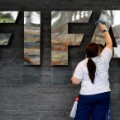

Story highlights
- UEFA takes Michel Platini off his job; he maintains his innocence
- Sepp Blatter, Platini and Jerome Valcke handed 90-day provisional bans
- FIFA presidential hopeful Chung Mong-joon was also banned for six years
(CNN)It's like the end of a Shakespearean tragedy. Multiple bodies: the king, the two men who would be king and their lieutenants strewn across the stage.
Even the acting king is planning his exit.
There was blood letting aplenty Thursday at the headquarters of one of the world's most popular sports as a number of FIFA top officials were sanctioned by the organization.
The disciplinary arm of world football's governing body handed three of its leading officials -- including President Sepp Blatter -- provisional 90-day bans.
UEFA President Michel Platini, who heads up the body which runs European football and the world's leading club competition -- the Champions League -- and FIFA Secretary General Jerome Valcke were also banned for 90 days.
Platini is a candidate to succeed Blatter as president of the organization, while another presidential hopeful South Korean Chung Mong-joon was also banned for six years and fined $103,000. Their bans arguably give both of them reputation problems in the race to succeed Blatter.
Platini, a Frenchman, also won't "perform his official duties for the time being" at UEFA, that association announced, in light of the FIFA decision.
Vowing to appeal, Platini claimed the allegations against him "are based on mere semblances and are astonishingly vague" and refused to withdraw his bid to become FIFA's next president.
"More than a sense of injustice or desire for revenge, I am driven by a profound feeling of staunch defiance," he said. "I am more determined than ever to defend myself before the relevant judicial bodies."
Until the FIFA presidential election -- or until there's a change in Blatter's status -- Issa Hayatou is in charge as the world governing body appointed him acting president. Hayatou is FIFA vice-president and head of the Confederation of African Football (CAF), the body that runs soccer on that continent.
A longtime soccer administrator, the 69-year-old Hayatou, who has been CAF's head since 1988, has faced his own problems in the past.
In 2011, he was sanctioned by the International Olympic Committee over taking cash payments from a sports marketing firm.
"I will serve only on an interim basis," said Hayatou in a statement. "A new president will be chosen by the Extraordinary Congress on 26 February 2016. I myself will not be a candidate for that position."

Comments